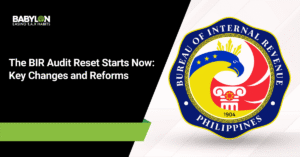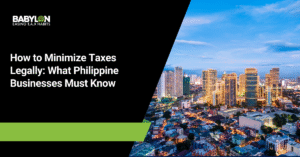Paying taxes is an obligation of any business, regardless of the size. It’s one of the requirements that will allow you to operate legally and avoid potential penalties.
For small businesses in the Philippines, navigating through the tax landscape can be particularly challenging. However, understanding the specific tax responsibilities that apply to your business is crucial for effective financial planning.
In this blog post, we’ll break down how much the tax is for small businesses in the Philippines, and provide guidance on how to manage them efficiently.
What is a Business Tax in the Philippines?
A business tax in the Philippines refers to various taxes imposed on individuals and entities that conduct business within the country. These taxes are administered by the Bureau of Internal Revenue (BIR) and local government units.
Business tax is essential because it helps fund public services and infrastructure projects that benefit the business community and the public at large.
Therefore, paying these taxes not only fulfills a legal duty but also supports economic growth and stability.
Types of Taxes for Small Businesses
Whether you’re a sole proprietor or running a corporation, familiarizing yourself with types of taxes can significantly impact your operations and profitability.
Here’s a comprehensive look at the various types of taxes that may apply to your business operations.
Income Tax
Income tax for small businesses varies based on the structure of the business:
- Sole Proprietorships and Professionals: If you operate a sole proprietorship or are a professional, you are subject to graduated income tax rates ranging from 5% to 32% based on your net taxable income. This progressive scale means that as your income increases, the rate at which it is taxed also increases.
- Corporations: For corporations, the income tax rate has been standardized at 25% of net taxable income, reduced from the previous 30% due to provisions in the CREATE Act. However, corporations that meet certain qualifications can avail of a lower 20% Regular Corporate Income Tax (RCIT) rate. To qualify for the 20% RCIT rate, a corporation must:
- Have a net taxable income not exceeding ₱5 million; and
- Have total assets not exceeding ₱100 million, excluding land on which the business entity’s office, plant, and equipment are situated.
Additionally, a Minimum Corporate Income Tax (MCIT) of 2% on gross income kicks in starting from the fourth taxable year of operation, ensuring that all profitable corporations contribute a baseline amount in taxes regardless of their deductions and credits.
Percentage Tax
Percentage tax is a simpler tax regime for smaller businesses. This tax involves a flat rate of 3% on gross sales or receipts and is applicable to businesses that are exempt from VAT. To fall under this tax, a business’s annual gross sales must not exceed PHP 1,919,500. The amount of percentage tax is calculated based on the gross sales or receipts of the business.
Percentage taxes are filed and paid quarterly, ensuring consistent revenue contribution to governmental resources. However, for certain industries, monthly percentage tax payments may also be required.
Value-Added Tax (VAT)
VAT is a broad-based consumption tax assessed on the value added to goods and services. It involves a standard rate of 12% applicable to a wide range of activities including importation, sales, exchanges, leases of goods, and services rendered.
Businesses surpassing PHP 3 million in gross sales are mandated to register and comply with VAT requirements, integrating this tax into their pricing structures and accounting systems.
Withholding Taxes
Withholding taxes play a crucial role in the tax collection mechanism by taxing transactions at the source:
Employee Compensation: Businesses with employees must withhold taxes on salaries and wages using BIR Forms 1601C (monthly) and 1601E (for certain other compensations).
Expanded Withholding Tax (EWT) and Final Withholding Tax (FWT): Taxes must be withheld on various transactions, such as payments to suppliers, professionals, and contractors, ensuring that all parties contribute appropriately to national revenues. The EWT is a form of withholding tax that serves as an advance payment for the recipient’s annual income tax, while the FWT represents the complete and final tax liability on the income received.
Fringe Benefits Tax
For businesses offering fringe benefits to managerial or supervisory staff, a 35% tax rate is imposed on the value of fringe benefits provided. This tax is paid by the employer and is meant to capture the fair market value of benefits like vehicles, housing, expense accounts, etc., ensuring equitable taxation on compensation in forms other than direct salary.
Local Business Taxes
Local governments also impose various taxes which can vary significantly from one locality to another. These may include taxes on gross sales, professional taxes, real estate taxes, and fees for business permits and licenses.
The exact nature and rate of these taxes depend on the municipal or city ordinances where the business operates.
Philippine Business Tax Rates and Thresholds for Small Businesses
For small businesses in the Philippines, it’s crucial to grasp the varying tax rates and thresholds that apply, as they form the backbone of your fiscal responsibilities to the government. These taxes fund essential services and contribute to national development, and staying informed ensures you can plan your finances with confidence.
Tax Rates
The Philippines offers differentiated tax rates for small businesses, based on their size and earnings:
- Micro Businesses: If your business’s gross sales or receipts don’t exceed ₱3 million per year, you’re off the hook for income tax, which is a significant incentive for micro businesses to thrive.
- Small Businesses: Enjoy a 20% corporate income tax rate if your net taxable income does not surpass ₱5 million and total assets are under ₱100 million, as opposed to the regular 25% rate. This reduced rate is designed to support small businesses’ growth and sustainability.
- Self-employed Individuals and Professionals: Your income tax rates vary from 5% to 32%, following a progressive tax bracket system that aligns your tax rate with your income level, ensuring fairness and equity in the tax system.
Threshold Rates
Thresholds play a pivotal role in determining your tax obligations:
- VAT Exemptions: Micro and small businesses with annual gross sales or receipts below ₱3 million are exempt from VAT, relieving them from the 12% standard rate that typically applies to the sale of goods, properties, and services.
- Percentage Tax: There’s a 3% percentage tax on businesses that aren’t VAT-registered and whose gross sales or receipts fall below ₱1,919,500 annually.
- Receipt Issuance: For transactions below ₱1,000, there’s no requirement to issue receipts or invoices, and there are no fees for securing the authority to print these from the BIR.
- Reduced Penalties: Micro businesses may benefit from reduced penalties and interest rates under specific conditions, easing the financial burden in case of tax disputes or late payments.
- BMBEs: Barangay Micro Business Enterprises with assets not exceeding ₱3 million can relish exemptions from income tax and minimum wage laws for two years, with a renewal option, fostering a supportive environment for grassroots business development.
It’s important to note that these rates and thresholds are not set in stone and may be updated. Always stay connected with the BIR or consult with a tax professional for the latest information.
Staying on top of your small business taxes in the Philippines is no small feat. That’s why tax services with personalized consultation and reminders are so valuable—they can save you from the headache of tax compliance.
Opting for professional tax assistance can streamline the complexities of tax compliance, offering you peace of mind and the freedom to concentrate on the core aspects of your business.
FAQ
How much tax does a small business pay in the Philippines?
Small businesses in the Philippines pay different taxes based on their earnings. Micro businesses with sales below ₱3 million are exempt from income tax. Others may pay a 20% corporate tax or follow a progressive income tax rate for individuals.
What is the tax rate for a Sari-Sari store?
Sari-Sari stores with annual income below ₱3 million are exempt from VAT and can opt for either a 3% percentage tax on gross sales or an 8% income tax on gross sales in excess of ₱250,000 in lieu of income and percentage tax. However, if the sari-sari store qualifies as a Marginal Income Earner (MIE) by generating less than ₱100,000 in annual income, it may not be subject to income tax at all, as per Revenue Memorandum Circular No. 7-2014. The applicability of a 1% tax rate for sari-sari stores under the CREATE Law requires further verification.
What are the taxes for sole proprietorship in the Philippines?
A sole proprietorship in the Philippines is subject to graduated income tax rates from 5% to 32%. They may also be liable for percentage tax or VAT, depending on their sales volume.
What is the 8% income tax rate?
The 8% income tax rate in the Philippines is an option for self-employed individuals (single proprietor, professional or mixed income earner) whose gross sales or receipts do not exceed ₱3 million. This rate is applied to gross sales or receipts in excess of ₱250,000, instead of the graduated income tax rates and percentage tax.
Ease Your Tax Journey with Babylon2k
Running a small business is challenging enough without the stress of taxes. Let Babylon2k lighten your load with our tax services.
We’re dedicated to demystifying your tax obligations, providing you with clarity and confidence. Join the myriad of Filipino small business owners who’ve transformed their tax challenges into triumphs. Get a quote today to see how we can assist you.
With Babylon2k, tax time becomes less about confusion and more about your business’s future success!






